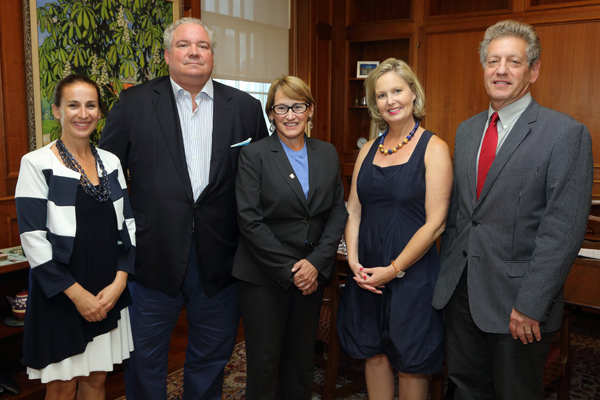
By Doug Sweet
McGill has renewed its relationship with the Jeanne Sauvé Foundation, which is responsible for the Sauvé Scholars Program that annually brings up to 14 young people from around the world to the University to broaden their horizons and encourage exchanges on a host of critical and fascinating issues.
On Tuesday, September 2, representatives of the Jeanne Sauvé Foundation met with Principal Suzanne Fortier to sign the Co-operation Agreement that confirms and renews the special relationship between the two organizations. McGill is not only the academic home of the Jeanne Sauvé Foundation, but has also been its founding partner in the Sauvé Scholars Program, which, during the decade between 2003 and 2013, welcomed 126 young leaders from 50 countries.
McGill provides mentors and other academic support, where appropriate, for the 12-14 Sauvé residential fellows, who are now participants in the re-designed Sauvé Public Leadership Program and for Sauvé Senior Fellows. Two McGill faculty members sit on the Board of the Foundation and McGill faculty also participate in the Foundation’s program and selection committees.
Following a year of significant strategic planning for the next decade, on July 1, the Foundation launched the new two-year Jeanne Sauvé Public Leadership Program. It builds on the success of the Sauvé Scholars Program, while adding new features that better correspond to evolving global needs, including a strengthened support for the global network of alumni and commitment to the prestigious annual Jeanne Sauvé Address held in co-operation with McGill.
“McGill prides itself on being a place where diverse cultural perspectives, diverse disciplines, and different ways of knowing come together,” said Prof. Fortier. “By sharing their experiences and viewpoints, the young leaders of the Sauvé Scholars program greatly enrich our learning environment.”
“McGill is very pleased to continue our collaboration with the Jean Sauvé Foundation, to provide an academic environment to support the goals of convening, connecting, engaging and empowering a new generation of public leadership in Canada and around the world,” said Martin Kreiswirth, Associate Provost and Dean of Graduate and Postdoctoral Studies.
Representing the Jeanne Sauvé Foundation were Jean-François Sauvé, son of the late Right Honourable Jeanne Sauvé, and Chairman, his wife Diane de Mailly-Nesle Sauvé, Secretary-Treasurer, and Désirée McGraw, President and Executive Director of the Foundation.
Hailing the renewal of the Cooperation Agreement as a concrete expression of the special relationship with McGill the Foundation has enjoyed throughout the years, Jean-François Sauvé thanked Prof. Fortier and all those involved in the process.
“McGill has in every way exceeded our expectations in terms of assistance and services, and above all in the warmth and depth of commitment to our young leaders from administrators and academics alike. It is truly our home,” he noted.
Each year, up to 14 young people are invited to come to Montreal for the academic calendar year. While they live together in a restored mansion on Dr. Penfield Blvd., they enjoy access to McGill’s academic programs and other resources – including lectures, conferences and events suited to the advancement of their individual professional and intellectual lives.
The program is an outgrowth of the Jeanne Sauvé Youth Foundation that was created in 1991 by Sauvé, Canada’s first female Speaker of the House of Commons and first female Governor-General. She died in 1993.
The Scholars program aims to provide to its young applicants a period of personal and professional growth, and is founded on:
• Intense exchange of ideas and experience, supported by communal life
• Extensive intellectual freedom, allowing each participant to develop according to his or her needs and aspirations
• Focus on action accompanied by a clear commitment to the community – including the host community
• Commitment to dialogue among cultures, which allows participants to understand and assimilate viewpoints built within multiple frames of reference
